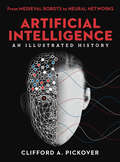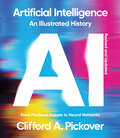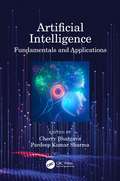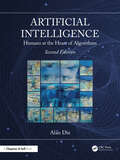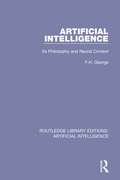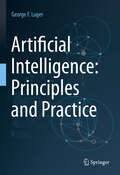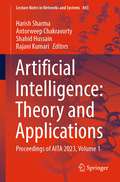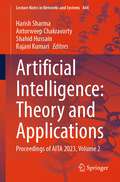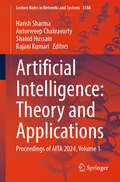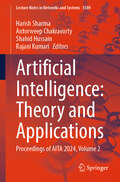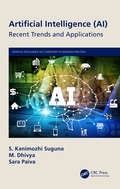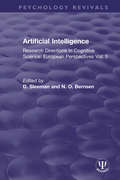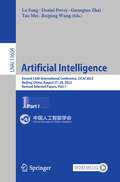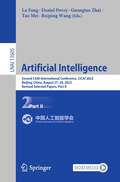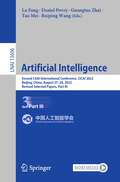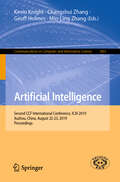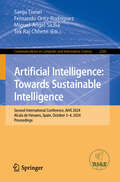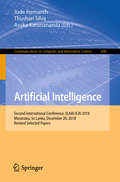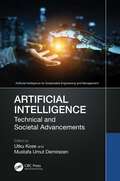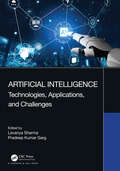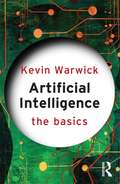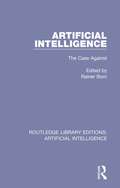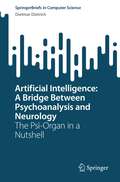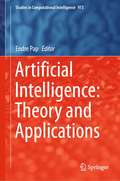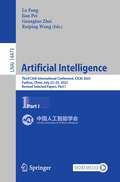- Table View
- List View
Artificial Intelligence: From Medieval Robots to Neural Networks (Union Square & Co. Illustrated Histories)
by Clifford A. Pickover“This is an addictive stroll through the annals of artificial intelligence, highlighting almost 100 innovations developed between 1300 BCE and 2018” (Booklist).From medieval robots and Boolean algebra to facial recognition, artificial neural networks, and adversarial patches, this fascinating history takes readers on a lively tour through the world of artificial intelligence. Award–winning author Clifford A. Pickover (The Math Book, The Physics Book, Death & the Afterlife) explores the historic and current applications of AI in such diverse fields as computing, medicine, popular culture, mythology, and philosophy, and considers the enduring threat to humanity should AI grow out of control. Across 100 illustrated entries, Pickover provides an entertaining and informative look into when artificial intelligence began, how it developed, where it’s going, and what it means for the future of human-machine interaction.“An enjoyable diversion to read cover to cover, follow along common strands, or dip into for random bits.” —Booklist
Artificial Intelligence: From Medieval Robots to Neural Networks (Union Square & Co. Illustrated Histories)
by Clifford A. PickoverA History of the Future that's Happening Right NowArtificial Intelligence: An Illustrated History explores the historic origins and current applications of AI in such diverse fields as computing, medicine, popular culture, mythology, and philosophy. Through more than 100 entries, award-winning author Clifford A. Pickover, offers a granular, yet accessible, glimpse into the world of AI—from medieval robots and Boolean algebra to facial recognition, and artificial neural networks. First released in 2019, this updated paperback edition brings readers up to speed with coverage of technologies such as DALL-E and ChatGPT, and it explores the very real fear that AI will alter the course of humanity—forever.
Artificial Intelligence: Fundamentals and Applications
by Cherry Bhargava Pradeep Kumar SharmaThis comprehensive reference text discusses the fundamental concepts of artificial intelligence and its applications in a single volume. Artificial Intelligence: Fundamentals and Applications presents a detailed discussion of basic aspects and ethics in the field of artificial intelligence and its applications in areas, including electronic devices and systems, consumer electronics, automobile engineering, manufacturing, robotics and automation, agriculture, banking, and predictive analysis. Aimed at senior undergraduate and graduate students in the field of electrical engineering, electronics engineering, manufacturing engineering, pharmacy, and healthcare, this text: Discusses advances in artificial intelligence and its applications. Presents the predictive analysis and data analysis using artificial intelligence. Covers the algorithms and pseudo-codes for different domains. Discusses the latest development of artificial intelligence in the field of practical speech recognition, machine translation, autonomous vehicles, and household robotics. Covers the applications of artificial intelligence in fields, including pharmacy and healthcare, electronic devices and systems, manufacturing, consumer electronics, and robotics.
Artificial Intelligence: Humans at the Heart of Algorithms
by Alan DixAn authoritative and accessible one-stop resource, the first edition of An Introduction to Artificial Intelligence presented one of the first comprehensive examinations of AI. Designed to provide an understanding of the foundations of artificial intelligence, it examined the central computational techniques employed by AI, including knowledge representation, search, reasoning and learning, as well as the principal application domains of expert systems, natural language, vision, robotics, software agents and cognitive modelling. Many of the major philosophical and ethical issues of AI were also introduced. This new edition expands and revises the book throughout, with new material to augment existing chapters, including short case studies, as well as adding new chapters on explainable AI, big data and deep learning, temporal and web-scale data, statistical methods and data wrangling. It expands the book’s focus on human-centred AI, covering gender, ethnic and social bias, the need for transparency, intelligent user interfaces, and designing interactions to aid machine learning. With detailed, well-illustrated examples and exercises throughout, this book provides a substantial and robust introduction to artificial intelligence in a clear and concise coursebook form. It stands as a core text for all students and computer scientists approaching AI.You can also visit the author website for further resources: https://alandix.com/aibook/.
Artificial Intelligence: Its Philosophy and Neural Context (Routledge Library Editions: Artificial Intelligence)
by F. H. GeorgeOriginally published in 1986, in order to probe, dispute and analyse the role of artificial intelligence in cybernetic thought and information science, the author pursues this topic within its philosophical, behavioral and neurophysiological contexts, while drawing attention to cognitive issues. By elucidating the problems and potential associated with knowledge-based systems, the book emphasized the need to examine artificial intelligence in its own right.
Artificial Intelligence: Principles and Practice
by George F. LugerThis book provides a complete introduction to Artificial Intelligence, covering foundational computational technologies, mathematical principles, philosophical considerations, and engineering disciplines essential for understanding AI. Artificial Intelligence: Principles and Practice emphasizes the interdisciplinary nature of AI, integrating insights from psychology, mathematics, neuroscience, and more. The book addresses limitations, ethical issues, and the future promise of AI, emphasizing the importance of ethical considerations in integrating AI into modern society. With a modular design, it offers flexibility for instructors and students to focus on specific components of AI, while also providing a holistic view of the field. Taking a comprehensive but concise perspective on the major elements of the field; from historical background to design practices, ethical issues and more, Artificial Intelligence: Principles and Practice provides the foundations needed for undergraduate or graduate-level courses. The important design paradigms and approaches to AI are explained in a clear, easy-to-understand manner so that readers will be able to master the algorithms, processes, and methods described. The principal intellectual and ethical foundations for creating artificially intelligent artifacts are presented in Parts I and VIII. Part I offers the philosophical, mathematical, and engineering basis for our current AI practice. Part VIII presents ethical concerns for the development and use of AI. Part VIII also discusses fundamental limiting factors in the development of AI technology as well as hints at AI's promising future. We recommended that PART I be used to introduce the AI discipline and that Part VIII be discussed after the AI practice materials. Parts II through VII present the three main paradigms of current AI practice: the symbol-based, the neural network or connectionist, and the probabilistic. Generous use of examples throughout helps illustrate the concepts, and separate end-of-chapter exercises are included. Teaching resources include a solutions manual for the exercises, PowerPoint presentation, and implementations for the algorithms in the book.
Artificial Intelligence: Proceedings of AITA 2023, Volume 1 (Lecture Notes in Networks and Systems #843)
by Shahid Hussain Harish Sharma Antorweep Chakravorty Rajani KumariThis book features a collection of high-quality research papers presented at International Conference on Artificial Intelligence: Theory and Applications (AITA 2023), held during 11–12 August 2023 in Bengaluru, India. The book is divided into two volumes and presents original research and review papers related to artificial intelligence and its applications in various domains including health care, finance, transportation, education, and many more.
Artificial Intelligence: Proceedings of AITA 2023, Volume 2 (Lecture Notes in Networks and Systems #844)
by Shahid Hussain Harish Sharma Antorweep Chakravorty Rajani KumariThis book features a collection of high-quality research papers presented at International Conference on Artificial Intelligence: Theory and Applications (AITA 2023), held during 11–12 August 2023 in Bengaluru, India. The book is divided into two volumes and presents original research and review papers related to artificial intelligence and its applications in various domains including health care, finance, transportation, education, and many more.
Artificial Intelligence: Proceedings of AITA 2024, Volume 1 (Lecture Notes in Networks and Systems #5588)
by Shahid Hussain Harish Sharma Antorweep Chakravorty Rajani KumariThis book features a collection of high-quality research papers presented at International Conference on Artificial Intelligence: Theory and Applications (AITA 2024), held during 9–10 August 2024 in Bengaluru, India. The book is divided into two volumes and presents original research and review papers related to artificial intelligence and its applications in various domains including health care, finance, transportation, education, and many more.
Artificial Intelligence: Proceedings of AITA 2024, Volume 2 (Lecture Notes in Networks and Systems #5589)
by Shahid Hussain Harish Sharma Antorweep Chakravorty Rajani KumariThis book features a collection of high-quality research papers presented at International Conference on Artificial Intelligence: Theory and Applications (AITA 2024), held during 9–10 August 2024 in Bengaluru, India. The book is divided into two volumes and presents original research and review papers related to artificial intelligence and its applications in various domains including health care, finance, transportation, education, and many more.
Artificial Intelligence: Recent Trends and Applications (Artificial Intelligence (AI): Elementary to Advanced Practices)
by S. Kanimozhi Suguna, M. Dhivya, and Sara PaivaThis book aims to bring together leading academic scientists, researchers, and research scholars to exchange and share their experiences and research results on all aspects of Artificial Intelligence. The book provides a premier interdisciplinary platform to present practical challenges and adopted solutions. The book addresses the complete functional framework workflow in Artificial Intelligence technology. It explores the basic and high-level concepts and can serve as a manual for the industry for beginners and the more advanced. It covers intelligent and automated systems and its implications to the real-world, and offers data acquisition and case studies related to data-intensive technologies in AI-based applications. The book will be of interest to researchers, professionals, scientists, professors, students of computer science engineering, electronics and communications, as well as information technology.
Artificial Intelligence: Research Directions in Cognitive Science: European Perspectives Vol. 5 (Psychology Revivals)
by D. Sleeman N. O. BernsenOriginally published in 1992, this title reviews seven major subareas in artificial intelligence at that time: knowledge acquisition; logic programming and representation; machine learning; natural language; vision; the design of an AI programming environment; and medicine, a major application area of AI. This volume was an attempt primarily to inform fellow AI workers of recent European work in AI. It was hoped that researchers in ‘sister’ disciplines, such as computer science and linguistics would gain a deeper understanding of the assumptions, techniques and tools of contemporary AI.
Artificial Intelligence: Second CAAI International Conference, CICAI 2022, Beijing, China, August 27–28, 2022, Revised Selected Papers, Part I (Lecture Notes in Computer Science #13604)
by Guangtao Zhai Tao Mei Lu Fang Ruiping Wang Daniel PoveyThis three-volume set LNCS 13604-13606 constitutes revised selected papers presented at the Second CAAI International Conference on Artificial Intelligence, held in Beijing, China, in August 2022. CICAI is a summit forum in the field of artificial intelligence and the 2022 forum was hosted by Chinese Association for Artificial Intelligence (CAAI).The 164 papers were thoroughly reviewed and selected from 521 submissions. CICAI aims to establish a global platform for international academic exchange, promote advanced research in AI and its affiliated disciplines such as machine learning, computer vision, natural language, processing, and data mining, amongst others.
Artificial Intelligence: Second CAAI International Conference, CICAI 2022, Beijing, China, August 27–28, 2022, Revised Selected Papers, Part II (Lecture Notes in Computer Science #13605)
by Guangtao Zhai Tao Mei Lu Fang Ruiping Wang Daniel PoveyThis three-volume set LNCS 13604-13606 constitutes revised selected papers presented at the Second CAAI International Conference on Artificial Intelligence, held in Beijing, China, in August 2022. CICAI is a summit forum in the field of artificial intelligence and the 2022 forum was hosted by Chinese Association for Artificial Intelligence (CAAI). The 164 papers were thoroughly reviewed and selected from 521 submissions. CICAI aims to establish a global platform for international academic exchange, promote advanced research in AI and its affiliated disciplines such as machine learning, computer vision, natural language, processing, and data mining, amongst others.
Artificial Intelligence: Second CAAI International Conference, CICAI 2022, Beijing, China, August 27–28, 2022, Revised Selected Papers, Part III (Lecture Notes in Computer Science #13606)
by Guangtao Zhai Tao Mei Lu Fang Ruiping Wang Daniel PoveyThis three-volume set LNCS 13604-13606 constitutes revised selected papers presented at the Second CAAI International Conference on Artificial Intelligence, held in Beijing, China, in August 2022. CICAI is a summit forum in the field of artificial intelligence and the 2022 forum was hosted by Chinese Association for Artificial Intelligence (CAAI). The 164 papers were thoroughly reviewed and selected from 521 submissions. CICAI aims to establish a global platform for international academic exchange, promote advanced research in AI and its affiliated disciplines such as machine learning, computer vision, natural language, processing, and data mining, amongst others.
Artificial Intelligence: Second CCF International Conference, ICAI 2019, Xuzhou, China, August 22-23, 2019, Proceedings (Communications in Computer and Information Science #1001)
by Min-Ling Zhang Kevin Knight Changshui Zhang Geoff HolmesThis book constitutes the refereed proceedings of the Second CCF International Conference on Artificial Intelligence, CCF-ICAI 2019, held in Xuzhou, China in August, 2019. The 23 papers presented were carefully reviewed and selected from 97 submissions. The papers are organized in topical sections on deep learning, image and video processing, NLP and recommender system, machine learning algorithms, and AI applications.
Artificial Intelligence: Second International Conference, AI4S 2024, Alcala de Henares, Spain, October 3–4, 2024, Proceedings (Communications in Computer and Information Science #2243)
by Miguel-Angel Sicilia Sanju Tiwari Fernando Ortiz-Rodriguez Tek Raj ChhetriThis book constitutes the proceedings of the Second International Conference on Artificial Intelligence: Towards Sustainable Intelligence, AI4S 2024, held in Alcala de Henares, Spain, during October 3-4, 2024. The 16 full papers and 2 short papers included in this book were carefully reviewed and selected from 59 submissions. They deal with trustworthy AI and related topics, focusing on software and its engineering; software development process management and methods, etc.
Artificial Intelligence: Second International Conference, SLAAI-ICAI 2018, Moratuwa, Sri Lanka, December 20, 2018, Revised Selected Papers (Communications in Computer and Information Science #890)
by Jude Hemanth Thushari Silva Asoka KarunanandaThis book constitutes the refereed proceedings of the Second International Conference, SLAAI-ICAI 2018, held in Moratuwa, Sri Lanka, in December 2018.The 32 revised full papers presented were carefully reviewed and selected from numerous submissions. The papers are organized in the following topical sections: intelligence systems; neural networks; game theory; ontology engineering; natural language processing; agent based system; signal and image processing.
Artificial Intelligence: Technical and Societal Advancements (Artificial Intelligence for Sustainable Engineering and Management)
by Utku Kose Mustafa Umut DemirezenThis book provides an examination of cutting-edge research and developments in the field of artificial intelligence. It seeks to extend the view in both technical and societal evaluations to ensure a well-defined balance for societal outcomes. It explores hot topics such as generative artificial intelligence, artificial intelligence in law, education, and climate change.Artificial Intelligence: Technical and Societal Advancements seeks to bridge the gap between theory and practical applications of AI by giving readers insight into recent advancements. It offers readers a deep dive into the transformative power of AI for the present and future world. As artificial intelligence continues to revolutionize various sectors, the book discusses applications from healthcare to finance and from entertainment to industrial areas. It discusses the technical aspects of intelligent systems and the effects of these aspects on humans. To this point, this book considers technical advancements while discussing the societal pros and cons in terms of human-machine interaction in critical applications. The authors also stress the importance of deriving policies and predictions about how to make future intelligent systems compatible with humans through a necessary level of human management. Finally, this book provides the opinions and views of researchers and experts (from public/private sector) including educators, lawyers, policymakers, managers, and business-related representatives.The target readers of this book include academicians; researchers; experts; policymakers; educators; and B.S., M.S., and Ph.D. students in the context of target problem fields. It can be used accordingly as a reference source and even supportive material for artificial intelligence-oriented courses.
Artificial Intelligence: Technologies, Applications, and Challenges
by Lavanya Sharma Pradeep Kumar GargArtificial Intelligence: Technologies, Applications, and Challenges is an invaluable resource for readers to explore the utilization of Artificial Intelligence, applications, challenges, and its underlying technologies in different applications areas. Using a series of present and future applications, such as indoor-outdoor securities, graphic signal processing, robotic surgery, image processing, character recognition, augmented reality, object detection and tracking, intelligent traffic monitoring, emergency department medical imaging, and many more, this publication will support readers to get deeper knowledge and implementing the tools of Artificial Intelligence. The book offers comprehensive coverage of the most essential topics, including: Rise of the machines and communications to IoT (3G, 5G). Tools and Technologies of Artificial Intelligence Real-time applications of artificial intelligence using machine learning and deep learning. Challenging Issues and Novel Solutions for realistic applications Mining and tracking of motion based object data image processing and analysis into the unified framework to understand both IoT and Artificial Intelligence-based applications. This book will be an ideal resource for IT professionals, researchers, under or post-graduate students, practitioners, and technology developers who are interested in gaining insight to the Artificial Intelligence with deep learning, IoT and machine learning, critical applications domains, technologies, and solutions to handle relevant challenges.
Artificial Intelligence: The Basics (The Basics)
by Kevin Warwick'if AI is outside your field, or you know something of the subject and would like to know more then Artificial Intelligence: The Basics is a brilliant primer.' - Nick Smith, Engineering and Technology Magazine November 2011 Artificial Intelligence: The Basics is a concise and cutting-edge introduction to the fast moving world of AI. The author Kevin Warwick, a pioneer in the field, examines issues of what it means to be man or machine and looks at advances in robotics which have blurred the boundaries. Topics covered include: how intelligence can be defined whether machines can 'think' sensory input in machine systems the nature of consciousness the controversial culturing of human neurons. Exploring issues at the heart of the subject, this book is suitable for anyone interested in AI, and provides an illuminating and accessible introduction to this fascinating subject.
Artificial Intelligence: The Case Against (Routledge Library Editions: Artificial Intelligence #3)
by Rainer BornThe purpose of this book, originally published in 1987, was to contribute to the advance of artificial intelligence (AI) by clarifying and removing the major sources of philosophical confusion at the time which continued to preoccupy scientists and thereby impede research. Unlike the vast majority of philosophical critiques of AI, however, each of the authors in this volume has made a serious attempt to come to terms with the scientific theories that have been developed, rather than attacking superficial ‘straw men’ which bear scant resemblance to the complex theories that have been developed. For each is convinced that the philosopher’s responsibility is to contribute from his own special intellectual point of view to the progress of such an important field, rather than sitting in lofty judgement dismissing the efforts of their scientific peers. The aim of this book is thus to correct some of the common misunderstandings of its subject. The technical term Artificial Intelligence has created considerable unnecessary confusion because of the ordinary meanings associated with it, and for that very reason, the term is endlessly misused and abused. The essays collected here all aim to expound the true nature of AI, and to remove the ill-conceived philosophical discussions which seek answers to the wrong questions in the wrong ways. Philosophical discussions and decisions about the proper use of AI need to be based on a proper understanding of the manner in which AI-scientists achieve their results; in particular, in their dependence on the initial planning input of human beings. The collection combines the Anglo-Saxon school of analytical philosophy with scientific and psychological methods of investigation. The distinguished authors in this volume represent a cross-section of philosophers, psychologists, and computer scientists from all over the world. The result is a fascinating study in the nature and future of AI, written in a style which is certain to appeal and inform laymen and specialists alike.
Artificial Intelligence: The Psi-Organ in a Nutshell (SpringerBriefs in Computer Science)
by Dietmar DietrichTo be able to merge the psyche with the neural system has been a long-sought goal. There is much scientific literature on results from research on this topic, but the goal of this “booklet” is to present the subject in a nutshell and to attract a wider audience to this highly complex topic. Scientists often need years to grasp the scope and implications of merging the psyche with the neural system. Does that really have to be the case? What does the simulated model look like? What are the underlying philosophies? Can it be understood without mathematical formalism? Uniting the psyche and neurology in one model, on the one hand, allows psychological and social theories to be tested on a scientific basis using simulation experiments. On the other hand, a model developed according to the functional structures of the human brain, let us call it the Psi-Organ, which comprises neurology and psyche as one unit, can serve as a basis for AI systems. These can be systems with cognitive capabilities that save human lives, save energy, ensure safety at airports, provide support in caring for the elderly and much more. In other words, systems that can simplify our lives in the most relevant ways and on a broad basis. This model, the Psi-Organ, goes far beyond today's primarily behavior-based AI methods. The manuscript can serve as an excellent introduction to the problem of understanding and modelling the human mind, and to the problem of achieving artificial “intelligence” in general, increasing awareness and understanding for the associated challenges. In that regard, it is a valuable supplementary text for advanced students or researchers in the field, notably not only in AI, but also (and perhaps primarily) in the medical fields.
Artificial Intelligence: Theory and Applications (Studies in Computational Intelligence #973)
by Endre PapThis book is an up-to-date collection, in AI and environmental research, related to the project ATLAS. AI is used for gaining an understanding of complex research phenomena in the environmental sciences, encompassing heterogeneous, noisy, inaccurate, uncertain, diverse spatio-temporal data and processes. The first part of the book covers new mathematics in the field of AI: aggregation functions with special classes such as triangular norms and copulas, pseudo-analysis, and the introduction to fuzzy systems and decision making. Generalizations of the Choquet integral with applications in decision making as CPT are presented. The second part of the book is devoted to AI in the geo-referenced air pollutants and meteorological data, image processing, machine learning, neural networks, swarm intelligence, robotics, mental well-being and data entry errors. The book is intended for researchers in AI and experts in environmental sciences as well as for Ph.D. students.
Artificial Intelligence: Third CAAI International Conference, CICAI 2023, Fuzhou, China, July 22–23, 2023, Revised Selected Papers, Part I (Lecture Notes in Computer Science #14473)
by Guangtao Zhai Jian Pei Lu Fang Ruiping WangThis two-volume set LNAI 14473-14474 constitutes revised selected papers presented at the Third CAAI International Conference, CICAI 2023, in Fuzhou, China, in July 2023. CICAI is a summit forum in the field of artificial intelligence and the 2023 forum was hosted by Chinese Association for Artificial Intelligence (CAAI). The 100 papers were thoroughly reviewed and selected from 376 submissions. CICAI 2023 conference covers a wide range of of AI generated content, computer vision, machine learning, nature language processing, application of AI, and data mining, amongst others.
